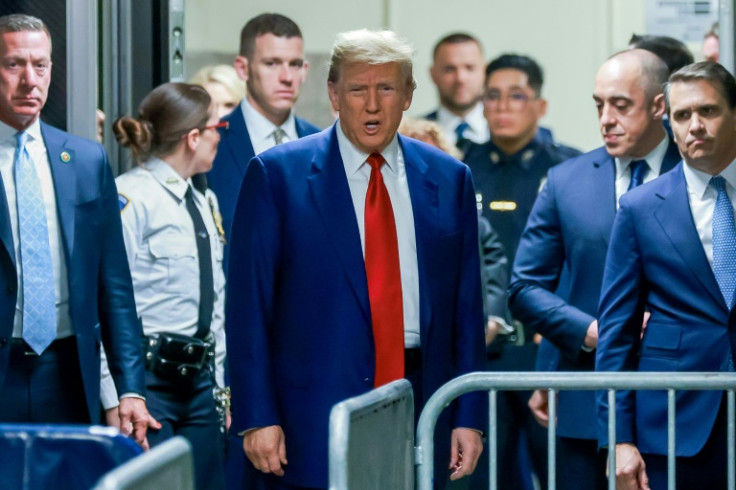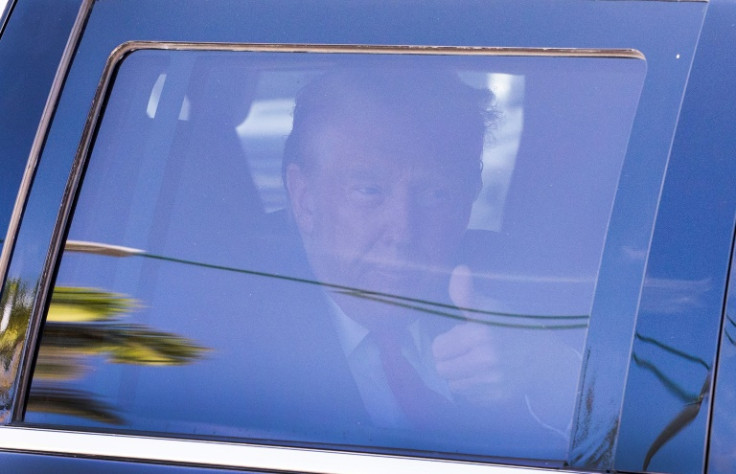Trump Trying To Run Out The Clock On Prosecutors

Facing a total of 88 felony charges in four separate federal and state cases, Donald Trump is employing a simple tactic that has always served him well in the past -- running out the clock.
The 77-year-old Republican presidential candidate has deployed an army of highly paid lawyers in New York, Washington, Georgia and Florida to push back his trial dates.
The goal is clear: delaying court action beyond the November election when, if he recaptures the presidency, he could potentially have the federal charges against him dropped -- or even pardon himself.
So far the strategy appears to be working.
"There is a chance that he could evade justice by delaying justice," said Adam Schiff, a Democratic member of the House of Representatives who was on the committee that investigated the January 6 attack on the US Capitol by Trump supporters refusing to accept the results of the 2020 election.
"This is a tried and true tactic of Trump throughout his career," Schiff told CNN. "The courts should not play into that stratagem."
Andrew Weissmann, a former federal prosecutor and author of a book, "The Trump Indictments," said the stalling tactics are understandable.
"Most defendants do not want to go to trial," Weissmann told AFP. "They are trying to put that off as much as possible."
Trump had been scheduled to go on trial in Washington on March 4 on charges of trying to overturn the results of the 2020 election won by Democrat Joe Biden, now his likely November opponent.
That trial has been delayed until the Supreme Court rules on Trump's claim that a former president enjoys immunity from prosecution.
The nation's highest court is to hear arguments in the immunity case on April 25 but may not issue a ruling until late June or even July.
Weissmann said it is "inexcusable" that the Supreme Court has put the case on "such a slow track."
In New York, Trump faces state charges of falsifying business records to pay pre-2016 election hush money to a porn star with whom he allegedly had a sexual encounter back in 2006.
That case was scheduled to start on Monday but Trump asked for it to be delayed by up to 90 days after prosecutors revealed that potential evidence had not been turned over to the defense.
The presiding judge swatted away those arguments on Monday and ordered the trial to begin on April 15, making it the only case for now with a fixed starting date.
In Georgia, Trump and 14 co-defendants face charges of seeking to overturn the 2020 election results in the southern state.
The Georgia case has been bogged down for weeks by a bid by Trump to have the district attorney disqualified because of a relationship she had with the man she hired to be the lead prosecutor.
The judge in the case finally ruled on March 15 that the district attorney could remain if the lead prosecutor resigned. That has now happened, but a trial date has yet to be set.
The final case involves Trump's hoarding of classified documents after leaving the White House and is being held in Florida before a judge appointed by the former president.
Daniel Richman, a law professor at Columbia University, said Trump's lawyers are employing the "normal dilatory tactics."
"When it involves a former president, inevitably, the issues are going to be unprecedented," Richman said. "Anyone who thinks that the Trump lawyers are these magical geniuses, I think is wrong."
In seeking delays, Trump's lawyers have cited the upcoming election and an unwritten rule that cases should not be brought within 60 days of a vote.
Prosecutors insist that the rule applies only to the filing of new charges and not the holding of an ongoing trial.
Schiff said the Justice Department may have unnecessarily dragged its heels in bringing charges against the former president.
"That delay has contributed to a situation where none of these trials may go forward, although it is still my hope and belief that at least one or two of them might go forward before the election," he said.

© Copyright AFP 2024. All rights reserved.





















